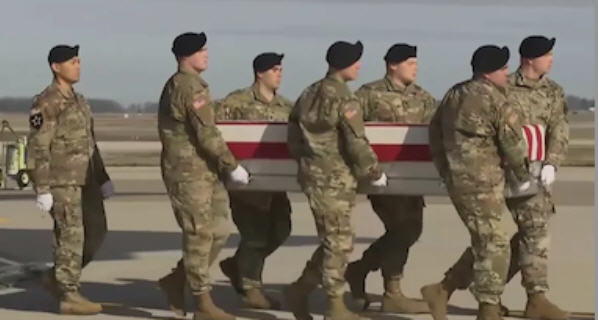Marlow’s Thirteen
When an American soldier dies in distant scrap heaps we are trying to turn into leafy town squares with suburbs and malls via combat, the space he or she occupied is immediately filled with dozens of people. And these people — relatives, friends, neighbors, reporters from both TV and print — create a lot of energy and noise, a sense of communal intensity, of fierce and shared dedication to the departed.
Amidst all that noise, nothing is louder than the silence of the departed. It’s a silence that’s one and quarter by two and quarter by seven feet of military grade steel. You feel it at your hip when you lift it and hear it rising up and out from the case, shouting to you and others in attendance to the corners and crevices of the empty faces and into the wounded souls of the bereaved.
It’s a silence that’s different from the one experienced at noncombatant funerals and wakes. The silence of those dead doesn’t carry with them the grey burden of the dark moments of these soldiers’ violent death. It’s a silence all know that all must get used to. But the silence of dead soldier is not something you want to get used to; you refuse to accept it, and so it screams at you.
The silence of these dead says to the civilians, Goodbye.
The silence of these dead says to their brothers in arms, Live.

Then it all falls apart. Even if standing on a breezy seashore beach, we mourners feel a thick and fiery breath upon our necks. Our beings tense and clench and there it is, in the sound both dry and deafening, where it all ended, the three volleys that shake off the sweat and the sun from our souls. We understand that the balance of the day has been destroyed. The unexceptional silence that follows those 21 short knocks on the door of misfortune.
Postscript: A wise and kind neighbor who saw my worried expression during the past three weeks had this to say after my telling him about my burden: “There’s holes in this imperfect world, see. Holes. And the likes of those Marine, Navy and Army troops outside that airport’s wires just sorta fell though ‘em. They weren’t bad kids or doing bad things, they just didn’t have anything to hold on to, that’s all. Now, who didn’t provide them hand holds, that’s another thing altogether. Seems those folks were practicing some weird kind of Zen and the art of not giving a shit.”
Copyright © 2021 From My Aisle Seat
www.vicsocotra.com
Normally, an Editor’s Note prefaces some of the commentary from the Writer’s Section at Socotra House. It is appropriate to place this note after Marlow’s words that strike deeply to the heart. There is a note to include on this one. One of the troops killed in this incident was a young woman who was nearing her delivery date. Her situation echoes that of the confusion on the ground. There is an argument that the number of Americans killed is one larger.
– Vic
